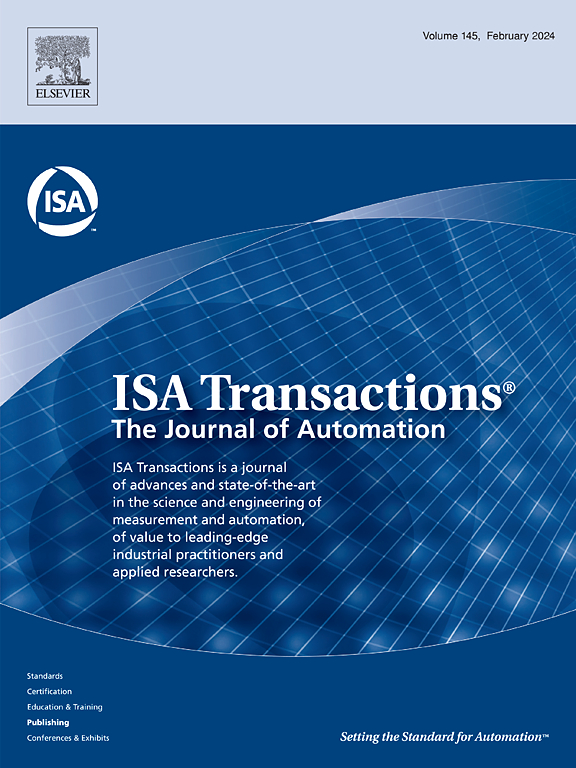Multiscale Conditional Adversarial Networks based domain-adaptive method for rotating machinery fault diagnosis under variable working conditions
IF 6.3
2区 计算机科学
Q1 AUTOMATION & CONTROL SYSTEMS
引用次数: 0
Abstract
Deep learning has been increasingly used in health management and maintenance decision-making for rotating machinery. However, some challenges must be addressed to make this technology more effective. For example, the collected data is assumed to follow the same feature distribution, and sufficient labeled training data are available. Unfortunately, domain shifts occur inevitably in real-world scenarios due to different working conditions, and acquiring sufficient labeled samples is time-consuming and expensive in complex environments. This study proposes a novel domain adaptive framework called deep Multiscale Conditional Adversarial Networks (MCAN) for machinery fault diagnosis to address these shortcomings. The MCAN model comprises two key components. Constructed by a novel multiscale module with an attention mechanism, the first component is a shared feature generator that captures rich features at different internal perceptual scales, and the attention mechanism determines the weights assigned to each scale, enhancing the model’s dynamic adjustment and self-adaptation capabilities. The second component consists of two domain classifiers based on Bidirectional Long Short-Term Memory (BiLSTM) leveraging spatiotemporal features at various levels to achieve domain adaptation in the output space. The deep domain classifier also captures the cross-covariance dependencies between feature representations and classifier predictions, thereby improving the predictions’ discriminability. The proposed method has been evaluated using two publicly available fault diagnosis datasets and one condition monitoring experiment. The results of cross-domain transfer tasks demonstrated that the proposed method outperformed several state-of-the-art methods in terms of transferability and stability. This result is a significant step forward in deep learning for health management and maintenance decision-making for rotating machinery, and it has the potential to revolutionize its future application.
基于多尺度条件对抗网络的域自适应方法,用于多变工作条件下的旋转机械故障诊断。
深度学习已越来越多地应用于旋转机械的健康管理和维护决策。然而,要使这项技术更加有效,必须应对一些挑战。例如,假设收集的数据遵循相同的特征分布,并且有足够的标注训练数据。遗憾的是,在现实世界中,由于工作条件的不同,难免会发生领域转移,而在复杂的环境中,获取足够的标注样本既费时又费钱。针对这些不足,本研究提出了一种用于机械故障诊断的新型域自适应框架,即深度多尺度条件对抗网络(MCAN)。MCAN 模型由两个关键部分组成。第一个组件是一个共享特征生成器,可捕捉不同内部感知尺度的丰富特征,而注意力机制则决定分配给每个尺度的权重,从而增强了模型的动态调整和自适应能力。第二部分由两个基于双向长短期记忆(BiLSTM)的领域分类器组成,利用各级时空特征实现输出空间的领域自适应。深度域分类器还能捕捉特征表征与分类器预测之间的交叉协方差依赖关系,从而提高预测的可辨别性。我们使用两个公开的故障诊断数据集和一个状态监测实验对所提出的方法进行了评估。跨领域转移任务的结果表明,所提出的方法在可转移性和稳定性方面优于几种最先进的方法。这一成果是深度学习在旋转机械健康管理和维护决策方面迈出的重要一步,有可能为其未来应用带来革命性的变化。
本文章由计算机程序翻译,如有差异,请以英文原文为准。
求助全文
约1分钟内获得全文
求助全文
来源期刊

ISA transactions
工程技术-工程:综合
CiteScore
11.70
自引率
12.30%
发文量
824
审稿时长
4.4 months
期刊介绍:
ISA Transactions serves as a platform for showcasing advancements in measurement and automation, catering to both industrial practitioners and applied researchers. It covers a wide array of topics within measurement, including sensors, signal processing, data analysis, and fault detection, supported by techniques such as artificial intelligence and communication systems. Automation topics encompass control strategies, modelling, system reliability, and maintenance, alongside optimization and human-machine interaction. The journal targets research and development professionals in control systems, process instrumentation, and automation from academia and industry.
 求助内容:
求助内容: 应助结果提醒方式:
应助结果提醒方式:


